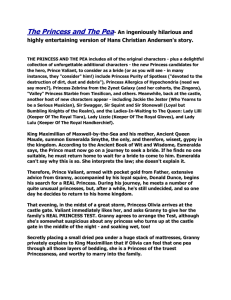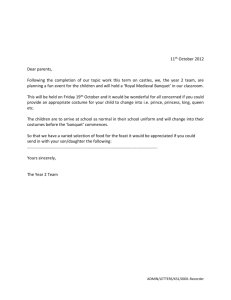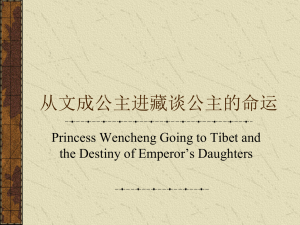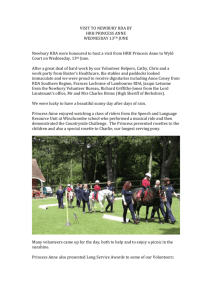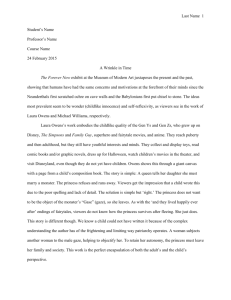143 F.3d 828 United States Court of Appeals, Fourth Circuit
advertisement
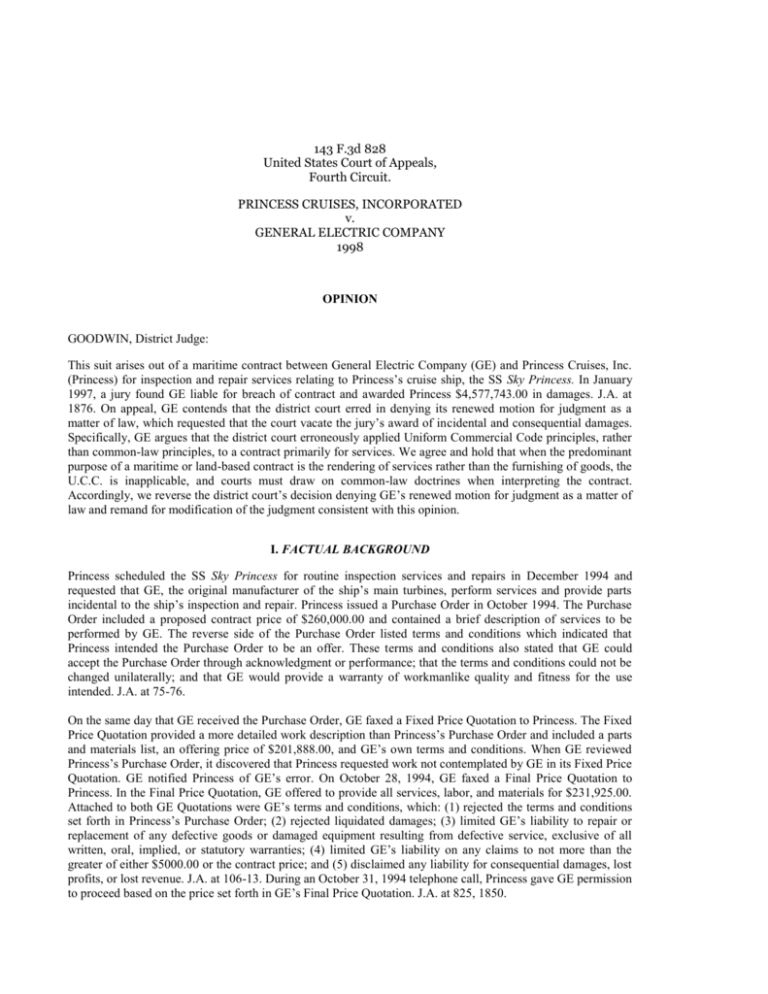
143 F.3d 828 United States Court of Appeals, Fourth Circuit. PRINCESS CRUISES, INCORPORATED v. GENERAL ELECTRIC COMPANY 1998 OPINION GOODWIN, District Judge: This suit arises out of a maritime contract between General Electric Company (GE) and Princess Cruises, Inc. (Princess) for inspection and repair services relating to Princess’s cruise ship, the SS Sky Princess. In January 1997, a jury found GE liable for breach of contract and awarded Princess $4,577,743.00 in damages. J.A. at 1876. On appeal, GE contends that the district court erred in denying its renewed motion for judgment as a matter of law, which requested that the court vacate the jury’s award of incidental and consequential damages. Specifically, GE argues that the district court erroneously applied Uniform Commercial Code principles, rather than common-law principles, to a contract primarily for services. We agree and hold that when the predominant purpose of a maritime or land-based contract is the rendering of services rather than the furnishing of goods, the U.C.C. is inapplicable, and courts must draw on common-law doctrines when interpreting the contract. Accordingly, we reverse the district court’s decision denying GE’s renewed motion for judgment as a matter of law and remand for modification of the judgment consistent with this opinion. I. FACTUAL BACKGROUND Princess scheduled the SS Sky Princess for routine inspection services and repairs in December 1994 and requested that GE, the original manufacturer of the ship’s main turbines, perform services and provide parts incidental to the ship’s inspection and repair. Princess issued a Purchase Order in October 1994. The Purchase Order included a proposed contract price of $260,000.00 and contained a brief description of services to be performed by GE. The reverse side of the Purchase Order listed terms and conditions which indicated that Princess intended the Purchase Order to be an offer. These terms and conditions also stated that GE could accept the Purchase Order through acknowledgment or performance; that the terms and conditions could not be changed unilaterally; and that GE would provide a warranty of workmanlike quality and fitness for the use intended. J.A. at 75-76. On the same day that GE received the Purchase Order, GE faxed a Fixed Price Quotation to Princess. The Fixed Price Quotation provided a more detailed work description than Princess’s Purchase Order and included a parts and materials list, an offering price of $201,888.00, and GE’s own terms and conditions. When GE reviewed Princess’s Purchase Order, it discovered that Princess requested work not contemplated by GE in its Fixed Price Quotation. GE notified Princess of GE’s error. On October 28, 1994, GE faxed a Final Price Quotation to Princess. In the Final Price Quotation, GE offered to provide all services, labor, and materials for $231,925.00. Attached to both GE Quotations were GE’s terms and conditions, which: (1) rejected the terms and conditions set forth in Princess’s Purchase Order; (2) rejected liquidated damages; (3) limited GE’s liability to repair or replacement of any defective goods or damaged equipment resulting from defective service, exclusive of all written, oral, implied, or statutory warranties; (4) limited GE’s liability on any claims to not more than the greater of either $5000.00 or the contract price; and (5) disclaimed any liability for consequential damages, lost profits, or lost revenue. J.A. at 106-13. During an October 31, 1994 telephone call, Princess gave GE permission to proceed based on the price set forth in GE’s Final Price Quotation. J.A. at 825, 1850. On November 1, 1994, GE sent a confirmatory letter to Princess acknowledging receipt of Princess’s Purchase Order and expressing GE’s intent to perform the services. J.A. at 115. The letter also restated GE’s $231,925.00 offering price from its Final Price Quotation and specified that GE’s terms and conditions, attached to the letter, were to govern the contract. Id. When the SS Sky Princess arrived for inspection, GE noted surface rust on the rotor and recommended that it be taken ashore for cleaning and balancing. The parties agree that during the cleaning, good metal was removed from the rotor, rendering the rotor unbalanced. Although GE attempted to correct the imbalance, Princess canceled a ten-day Christmas cruise as a result of delays caused by the repair. At trial, Princess alleged that the continued vibration and high temperatures caused damage to the ship, forcing additional repairs and the cancellation of a ten-day Easter cruise. It was undisputed, however, that Princess paid GE the full amount of the contract: $231,925.00. J.A. at 1008. On April 22, 1996, Princess filed a four-count complaint against GE, alleging breach of contract, breach of express warranty, breach of implied maritime warranty, and negligence. The district court granted GE’s motion for summary judgment as to the negligence claim. Following Princess’s presentation of evidence at trial, GE made a motion for judgment as a matter of law, which the district court denied. At the conclusion of the defendant’s presentation of evidence, the district court denied GE’s second motion for judgment as a matter of law. In instructing the jury, the district court drew on principles set forth in U.C.C. § 2-207 and allowed the jury to imply the following terms as part of the contract: (1) the warranty of merchantability; (2) the warranty of fitness for a particular purpose; (3) the warranty of workmanlike performance; (4) Princess’s right to recover damages for GE’s alleged breach of the contact; and (5) Princess’s right to recover incidental and consequential damages, as well as lost profits, proximately caused by GE’s alleged breach. On January 24, 1997, the jury returned a $4,577,743.00 verdict in favor of Princess. On February 3, 1997, GE renewed its motion for judgment as a matter of law requesting that the court vacate the jury’s award of incidental and consequential damages. The district court heard oral argument on May 6, 1997. Following oral argument, the district court denied GE’s renewed motion for judgment as a matter of law and issued an opinion clarifying its ruling. II. STANDARD OF REVIEW The Court reviews de novo the district court’s denial of GE’s renewed motion for judgment as a matter of law. Judgment as a matter of law is proper “when, without weighing the credibility of the evidence, there can be but one reasonable conclusion as to the proper judgment.” In reviewing the district court’s decision, we consider the evidence in the light most favorable to the nonmovant to determine whether the evidence presented at trial was sufficient to allow a reasonable jury to render a verdict in the nonmovant’s favor. III. TO APPLY U.C.C. PRINCIPLES TO A MARITIME CONTRACT FOR SERVICES WOULD HINDER ADMIRALTY LAW’S GOALS OF UNIFORMITY AND PREDICTABILITY Although GE contended that the district court was required to determine whether goods or services predominated before applying U.C.C. principles to the GE-Princess contract, the district court found it “unnecessary for the Court to determine whether the contract is primarily one for goods or services. In either case, the UCC is regarded as a source of admiralty law.” J.A. at 2024. We respectfully disagree. One of the primary concerns of admiralty law is uniformity and predictability. See American Dredging Co. v. Miller, 510 U.S. 443, 450-51, 114 S.Ct. 981, 986-87, 127 L.Ed.2d 285 (1994) (noting the constitutionally based principle that admiralty law should be “a system of law coextensive with, and operating uniformly in, the whole country”) (quoting The Lottawanna, 88 U.S. (21 Wall.) 558, 575, 22 L.Ed. 654 (1900)); Coats v. Penrod Drilling Corp., 61 F.3d 1113, 1137 (5th Cir.1995) (“Uniformity and predictability are important in admiralty....”). To avoid the creation of multiple and conflicting rules of decision in admiralty, the Fourth Circuit has stated that, “Absent reason to do otherwise, we prefer to adopt rules in admiralty that accord with, rather than diverge from, standard commercial practice.” Finora Co. v. Amitie Shipping, Ltd., 54 F.3d 209, 21314 (4th Cir.1995). As discussed in more detail below, standard commercial practice requires that a transaction be predominantly for the sale of goods before the U.C.C. applies. See Coakley & Williams, Inc. v. Shatterproof Glass Corp., 706 F.2d 456, 460 (4th Cir.1983); Bonebrake v. Cox, 499 F.2d 951, 960 (8th Cir.1974). In its May 13, 1997 opinion, the district court correctly noted that U.C.C. principles inform admiralty law. See Southworth Mach. Co. v. F/V Corey Pride, 994 F.2d 37, 40 n. 3 (1st Cir.1993); Clem Perrin Marine Towing, Inc. v. Panama Canal Co., 730 F.2d 186, 189 (5th Cir.1984). However, we are unpersuaded by cases cited to support the district court’s legal determination that U.C.C. § 2-207 applies to maritime transactions regardless of the nature of the transaction. Given admiralty law’s goals of uniformity and predictability, we find that mixed maritime contracts for goods and services are subject to the same inquiry as land-based mixed contracts. Therefore, a court must first determine whether the predominant purpose of the transaction is the sale of goods. Once this initial analysis has been performed, the court then may properly decide whether the common law, the U.C.C., or other statutory law governs the transaction. Cf. Little Beaver Enters. v. Humphreys Rys., 719 F.2d 75, 79 n. 7 (4th Cir.1983) (noting that maritime contract for services was not covered by U.C.C.); In re American Export Lines, Inc., 620 F.Supp. 490, 515 (S.D.N.Y.1985). This method accords with standard commercial practice and lends predictability to maritime contracts. IV. THE GE-PRINCESS CONTRACT WAS PREDOMINANTLY FOR SERVICES In its order denying GE’s renewed motion for judgment as a matter of law, the district court addressed GE’s contention that the district court erroneously included U.C.C. principles in its jury instructions. J.A. at 2021. Both by motion and at trial, GE argued that the district court was required to find that the sale of goods predominated in the GE-Princess contract before employing U.C.C. principles in its instructions. Although the U.C.C. governs the sale of goods, the U.C.C. also applies to certain mixed contracts for goods and services. Whether a particular transaction is governed by the U.C.C., rather than the common law *833 or other statutory law, hinges on the predominant purpose of the transaction, that is, whether the contract primarily concerns the furnishing of goods or the rendering of services. See Coakley & Williams, 706 F.2d at 458 (“Whether the U.C.C. applies turns on a question as to whether the contract ... involved principally a sale of goods, on the one hand, or a provision of services, on the other.”); see also Long Island Lighting Co. v. Imo Indus. Inc., 6 F.3d 876, 888 (2d Cir.1993); Ryan v. Wersi Elecs. GmbH & Co., 3 F.3d 174, 181 n. 3 (7th Cir.1993). Thus, before applying the U.C.C., courts generally examine the transaction to determine whether the sale of goods predominates. See Coakley & Williams, 706 F.2d at 458. Because the facts in this case are sufficiently developed and undisputed, it is proper for the Court to determine on appeal whether the GEPrincess transaction was a contract for the sale of goods within the scope of the U.C.C. Cf. Cambridge Plating Co. v. Napco, Inc., 991 F.2d 21, 24 (1st Cir.1993). In determining whether goods or services predominate in a particular transaction, we are guided by the seminal case of Bonebrake v. Cox, 499 F.2d 951 (8th Cir.1974). In holding the U.C.C. applicable, the Bonebrake court stated: The test for inclusion or exclusion is not whether they are mixed but, granting that they are mixed, whether their pre dominant factor, their thrust, their purpose, reasonably stated, is the rendition of service, with goods incidentally involved (e.g., contract with artist for painting) or is a transaction of sale, with labor incidentally involved (e.g., installation of a water heater in a bathroom). Bonebrake, 499 F.2d at 960. The Fourth Circuit has deemed the following factors significant in determining the nature of the contract: (1) the language of the contract, (2) the nature of the business of the supplier, and (3) the intrinsic worth of the materials. See Coakley & Williams, 706 F.2d at 460 (applying Maryland law). It is plain that the GE-Princess transaction principally concerned the rendering of services, specifically, the routine inspection and repair of the SS Sky Princess, with incidental-albeit expensive-parts supplied by GE. Although Princess’s standard fine-print terms and conditions mention the sale of goods, J.A. at 76, Princess’s actual purchase description requests a GE “service engineer” to perform service functions: the opening of valves for survey and the inspection of the ship’s port main turbine. J.A. at 75. GE’s Final Price Quotation also contemplates service functions, stating in large print on every page that it is a “Quotation for Services.” J.A. at 107-09. The Final Price Quotation’s first page notes that GE is offering a quotation for “engineering services.” J.A. at 106. GE’s Quotation further specifies that the particular type of service offered is “Installation/Repair/Maintenance.” J.A. at 107. The Final Price Quotation then lists the scope of the contemplated work-opening, checking, cleaning, inspecting, disassembling-in short, service functions. J.A. at 110; see also J.A. at 1862-68 (listing service tasks actually performed by GE). Although GE’s materials list shows that GE planned to manufacture a small number of parts for Princess, Princess appeared to have had most of the needed materials onboard. J.A. at 111. Thus, the language of both the Purchase Order and the Final Price Quotation indicates that although GE planned to supply certain parts, the parts were incidental to the contract’s predominant purpose, which was inspection, repair, and maintenance services. As to the second Coakley factor-the nature of the business of the supplier-although GE is known to manufacture goods, GE’s correspondence and Quotations came from GE’s Installation and Service Engineering Department. J.A. at 97, 106, 115. Evidence at trial showed that GE’s Installation and Service Engineering division is comprised of twenty-seven field engineers who perform service functions, such as overhauls and repairs. J.A. at 1076. Finally, the last Coakley factor-the intrinsic worth of the materials supplied-cannot be determined because neither Princess’s Purchase Order nor GE’s Final Price Quotation separately itemized the value of the materials. Instead, both the Purchase Order and the Final Price Quotation blend the cost of the materials into the final price of a services contract, thereby confirming that services rather than materials predominated in the transaction. Although not a Coakley factor, it is also telling that, during oral argument, Princess’s counsel admitted that the gravamen of Princess’s complaint did not arise out of GE’s furnishing of deficient parts, but rather out of GE’s deficient services. See J.A. at 23-27 (Princess’s Complaint stating that Princess’s damages arose out of “GE’s inspection, supervision ... recommendation ... reinstallation and realignment of the turbine unit.”)…. Accordingly, we find as a matter of law that services rather than goods predominated in the GE-Princess contract. V. UNDER COMMON LAW, GE’S FINAL PRICE QUOTATION WAS A COUNTEROFFER ACCEPTED BY PRINCESS The parties do not dispute that a contract was formed by their exchange of documents. J.A. at 2020. And there is no dispute that the GE-Princess contract for ship inspection and repair is maritime in nature and governed by the substantive law of admiralty. Kossick v. United Fruit Co., 365 U.S. 731, 735, 81 S.Ct. 886, 889-90, 6 L.Ed.2d 56 (1961) (contract to repair ship is within admiralty jurisdiction). However, the issue here-whether courts should draw on U.C.C. principles or on common-law doctrines when assessing the formation of a maritime services contract-is undecided. When no federal statute or well-established rule of admiralty exists, admiralty law may look to the common law or to state law, either statutory or decisional, to supply the rule of decision. Byrd v. Byrd, 657 F.2d 615, 617 (4th Cir.1981) (admiralty may look to state law to supply rule of decision); Bell v. Tug Shrike, 332 F.2d 330, 334 (4th Cir.1964) (in absence of maritime or clear-cut common-law rule, court may look to state law for rule of decision). Because the majority of states refer to common-law principles when assessing contracts predominantly for services, we choose to do the same. Under the common law, an acceptance that varies the terms of the offer is a counteroffer which rejects the original offer. RESTATEMENT (SECOND) OF CONTRACTS § 59 (1981) (“A reply to an offer which purports to accept it but is conditional on the offeror’s assent to terms additional to or different from those offered is not an acceptance but is a counter-offer.”). Virginia follows the same rule. See Chang v. First Colonial Savs. Bank, 242 Va. 388, 410 S.E.2d 928, 931 (1991). Here, GE’s Final Price Quotation materially altered the terms of Princess’s Purchase Order by offering a different price, limiting damages and liability, and excluding warranties. Thus, GE’s Final Price Quotation was a counteroffer rejecting Princess’s Purchase Order. Although Princess could have rejected GE’s counteroffer, Princess accepted the Final Price Quotation by giving GE permission to proceed with the repair and maintenance services, by not objecting to the confirmatory letter sent by GE, and by paying the amount set forth in GE’s Final Price Quotation, $231,925.00, rather than the $260,000.00 price term set forth in Princess’s Purchase Order. At common law, an offeror who proceeds under a contract after receiving the counteroffer can accept the terms of the counteroffer by performance. See Diamond Fruit Growers, Inc. v. Krack Corp., 794 F.2d 1440, 1443 (9th Cir.1986) (citing C. Itoh & Co. (America) v. Jordan Int’l Co., 552 F.2d 1228, 1236 (7th Cir.1977)); Durham v. National Pool Equip. Co. of Va., 205 Va. 441, 138 S.E.2d 55, 58 (1964) ( “Assent may be inferred from the acts and conduct of the parties.”) (citations omitted). Although GE and Princess never discussed the Purchase Order’s and the Final Price Quotation’s conflicting terms and conditions, both Princess’s actions and inaction gave GE every reason to believe that Princess assented to the terms and conditions set forth in GE’s Final Price Quotation. See RESTATEMENT (SECOND) OF CONTRACTS § 19(1) (1981) (“The manifestation of assent may be made wholly or partly by written or spoken words or by other acts or by failure to act.”); Wells v. Weston, 229 Va. 72, 326 S.E.2d 672, 676 (1985) (“The mental assent of[contracting] parties is not requisite for the formation of a contract.... In evaluating a party’s intent ... we must examine his outward expression rather than his secret, unexpressed intention.”) (citations omitted). Accordingly, we find that the terms and conditions of GE’s Final Price Quotation control liability and damages in the GE-Princess transaction. VI. THE VERDICT DEMONSTRATES THAT THE JURY IMPERMISSIBLY RELIED ON A CONTRACT OTHER THAN GE’S FINAL PRICE QUOTATION For the reasons stated above, the jury could only have considered one contract in awarding damages: GE’s Final Price Quotation. The Quotation restricted damages to the contract price, $231,925.00, and eliminated liability for incidental or consequential damages and lost profits or revenue. Moreover, GE’s Final Price Quotation controlled the warranties available to its customers. Yet the jury awarded $4,577,743.00 in damages to Princess. This verdict demonstrates that the jury relied on Princess’s Purchase Order or some other contract when awarding damages. See J.A. at 2025 (district court opinion noting that “the jury either found that Princess’[s] Purchase Order governed or that neither parties’ document established the complete contract”). As a matter of law, the jury could only have awarded damages consistent with the terms and conditions of GE’s Final Price Quotation and could not have awarded incidental or consequential damages. By requesting that the Court award Princess the maximum amount available under the Final Price Quotation, see Appellant’s Brief at 39-40; Appellant’s Reply Brief at 20, GE concedes that it breached its contract with Princess and that damages consistent with its Final Price Quotation are appropriate. Accordingly, we find it unnecessary to remand for a new trial on this issue. We reverse the district court’s decision denying GE’s motion for judgment as a matter of law and remand for entry of judgment against GE in the amount of $231,925.00, interest to accumulate from the date of the original judgment. REVERSED AND REMANDED.


